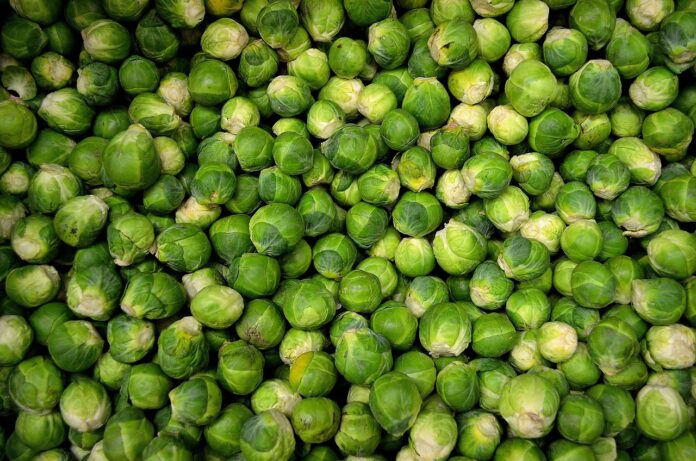Brussels sprouts are a nutritious leafy green vegetable belonging to the Brassica family, closely related to kale, broccoli, and cabbage. These small, round buds resemble miniature cabbages, typically growing in clusters along the stalk of the Brassica oleracea plant. Native to the Mediterranean region, they are named after Brussels, Belgium, where they gained popularity in the 16th century.
Interesting Facts About Brussels Sprouts:
- Named After Brussels: Brussels sprouts earned their name from Brussels, Belgium, where they have been cultivated since the 16th century. Their cultivation spread throughout Europe, with the vegetable becoming particularly popular in Belgium, France, and later the Netherlands
- American Introduction: In the early 19th century, French settlers brought Brussels sprouts to North America. Today, the vegetable is grown predominantly in California, as the state’s climate offers ideal conditions for their cultivation. California is now a leading global exporter of Brussels sprouts
- World’s Largest Sprout: The largest recorded Brussels sprout was grown by Bernard Lavery in the UK, weighing in at more than 18 pounds. This gigantic sprout surpassed all typical size expectations, setting a unique agricultural record
- Christmas Tradition: Brussels sprouts are a traditional feature of Christmas dinners in many countries, especially in the UK. They are often served alongside turkey and other festive dishes, symbolizing the winter harvest and adding nutritional value to holiday meals
- Unpopular Burger Experiment: In 2010, Burger King introduced a Brussels sprout burger in the UK as a limited-time holiday offering. The burger, which featured sprouts and cheese, was met with disinterest and was ultimately pulled from the menu due to poor sales
- The UK produces around 82,000 tons of Brussels sprouts annually, with nearly all being consumed domestically. The United Kingdom has a long tradition of including Brussels sprouts in holiday meals, particularly around Christmas, contributing to the country’s annual consumption
- Vitamin C Powerhouse: In addition to its immune-boosting properties, the vitamin C in Brussels sprouts helps in collagen formation, vital for maintaining healthy skin, cartilage, and tendons. A serving of Brussels sprouts provides a significant portion of the daily recommended intake of this vitamin
- Bitter Taste Gene: Brussels sprouts contain bitter compounds, which are more pronounced for individuals with a particular gene (TAS2R38). This gene makes some people more sensitive to bitter tastes, explaining why Brussels sprouts are disliked by about 50% of people, particularly children
- Environmental Power: Brussels sprouts are part of the Brassica family, which is known for its potential in bioenergy. In 2013, the UK used Brussels sprouts to generate electricity, powering a Christmas tree. This experiment highlighted the potential for using organic materials like Brussels sprouts for sustainable energy
- Overcooking Warning: Overcooking Brussels sprouts releases sulfur compounds, which give off a strong, unpleasant odor. This is why it’s recommended to cook them lightly, either by roasting, steaming, or stir-frying, to avoid the “sulfur smell” associated with overcooked sprouts
- Preservation Tip: Brussels sprouts can be stored for up to 10 days in the refrigerator if placed in a perforated plastic bag. When cooked, they can be frozen and stored for up to a year. Freezing helps retain their nutrient content, making them a great vegetable to stock up on during the harvest season
- Competitive Eating Record: In 2014, competitive eater Emma Dalton ate 325 Brussels sprouts in just 36 minutes, showcasing the remarkable (and somewhat quirky) endurance involved in competitive eating. Though this record wasn’t officially recognized by Guinness World Records, it highlighted the enthusiasm some people have for Brussels sprouts
- High Fiber Content: One cup of Brussels sprouts provides more than 3 grams of dietary fiber, which supports digestion, helps manage cholesterol levels, and aids in maintaining a healthy weight. Fiber also contributes to blood sugar control and overall gut health
- Record-Setting Brussels Sprout Size: In 1992, a man named Bernard Lavery in Wales set a Guinness World Record by growing a Brussels sprout weighing an astonishing 18 pounds, 3 ounces, making it a standout vegetable for that holiday season
- Brussels Sprout Eating Challenge: In 2008, Linus Urbanec from Sweden set a Guinness World Record by eating 31 Brussels sprouts in just one minute. This feat, while impressive, likely led to some digestive discomfort afterward
- The Dangers of Overeating: Brussels sprouts are rich in Vitamin K, which is essential for blood clotting. However, people on anticoagulant medications should avoid consuming large amounts, as it can interfere with their medication. One individual in Scotland was hospitalized after eating too many Brussels sprouts while on blood thinners, rendering his medication ineffective
- Bizarre Charity Stunt: In 2015, Stuart Kettel made an already-challenging climb of Mount Snowdon in Wales even more difficult by pushing a Brussels sprout with his nose all the way to the summit, raising funds for cancer research. It took him four days to reach the top, and the stunt wore out 22 Brussels sprouts during the journey
